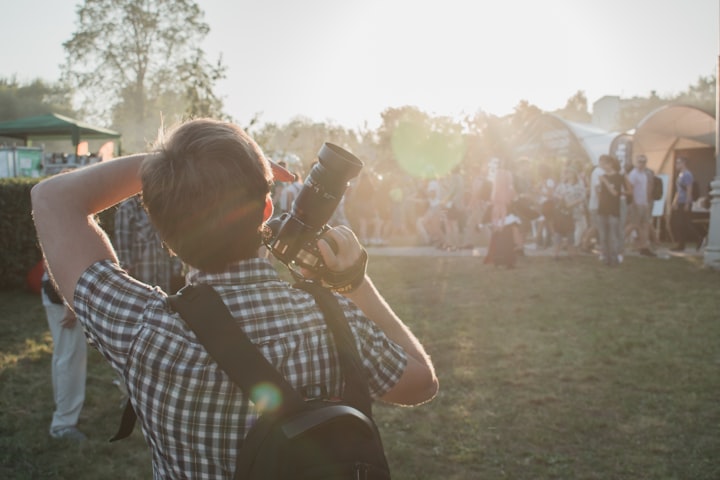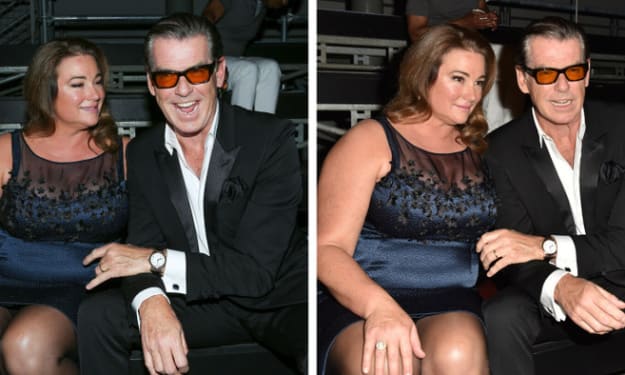Choose Wisely, This Job Isn’t For Everyone.
Difficulties in Broadcast News

I am a Photojournalist and a Technical Director. I spent the last 15 years working in Broadcast News. I have worked at four different news stations in the southeast. I find when people ask me about my work, I don’t have to explain the importance of my job. Instead, I have to correct various misconceptions about working for the press, and the television industry.
The responsibility of a Photojournalist is to record historical and public events in a visual capacity. Photojournalists support journalists, by recording interviews and visuals that back up factual statements and provide proof. As a Videographer, I videotaped sound bites and edited them together with video clips into 2 minute stories called packages. These packages ran on air on local television channels to inform the public of things occurring in the community.
The Technical Director is responsible for the presentation of the entire news broadcast. The TD ensures that the viewing public sees and hears everything as clearly and easily as possible. We control the cameras and the microphones. We dictate graphics in monitors and music. We play the video and packaged stories that are created by journalists working behind the scenes. The news is a team effort and many people work together to inform the public, but It’s the TD that showcases everyone’s work in the correct manner. A journalist can do everything right and create the perfect story, but that story will not be seen without the Technical Director.
I love what I do. I don’t want to do anything else. This is what I’ve decided to spent most of my time and energy doing. Everyone has challenging days, but that’s one of the things I love about this profession. I’m presented with problems on a daily basis. I work with passionate people that get upset when things to work out. As long as everyone works hard and contribute, things run smoothly. Things go wrong because the wrong people get involved. People who have no business being in this profession. It’s the wrong people that make my job infinitely more difficult.
Recently, I was asked for advice to give to people looking to study Journalism. I told the person, make sure this is what you want to devote your life to doing. My job is very stressful and demanding, and it is not meant for everyone. People get into the industry for many reasons and they are not always the right reasons. There are five things to consider before deciding to commit themselves to a career in Broadcasting.
Number one: The money is terrible. It’s worst than terrible. I’ve gone into debt working for the same salary as a McDonalds Manager. People assume that if you work in TV, then you make lots of money. This is a horrible misconception. There are 200 markets, you need to work at one of the top twenty to make a decent living. The number one market is based out of New York. On-air Talent make the most money. Meteorologists are usually the top earners in each market. Stations have budgets, and most of the budget goes to paying the anchors and reporters. These people are the face of the station and are who people hold accountable for what is seen on the news. Crew operating behind the scenes, usually make minimum wage or the average salary for the city they are located. At my first station, I was paid the current minimum wage. I had to work a second job to make ends meet. The Chief Meteorologist, at the second station I worked at, made five times what I was paid. They are paid more because they have specialized training and certification. The local meteorologist in Florida, does not make the same salary, as a New York City Meteorologist.
Number two: The work is dangerous. When I was a Photojournalist, I was asked to do dangerous things. I was asked to set up live shots in thunderstorms. The microwave live truck i used, emitted radiation and carbon monoxide. I’ve been shocked changing fuses. I carried 40 pounds of gear in 100 degree heat. I’ve gotten sick off of car fumes, running cables to cameras along side major highways. I’ve cut myself. I’ve fallen. These are the normal everyday injuries. I’m still here, but there have been others who were not so lucky. People have died from carbon monoxide poisoning, because they shut themselves in the live truck to work on their stories. People have been electrocuted when lightning hit the masts on top of live trucks. Car accidents have happened. A Reporter and Photographer were killed when a tree fell on their truck, during storm coverage. There is a memorial in New York, dedicated to the journalists who died when the towers fell.
Number three: People/the general public are horrible to you. Working for the press also makes you a target. I have had obscenities yelled at me from people in cars. I’ve had things thrown at me. People have invaded my personal space and yelled at me to get off public land. I’ve been followed home by people wanting to know what I’m reporting on, simply because I was driving a station vehicle. I’ve sat with reporters, in tears, because a viewer sent them a nasty email. Emails that say you have no business being on TV because you’re fat, ugly, black, Hispanic, etc. I’ve never been assaulted, but there have been others who have been. Reporters had there gear set on fire during the Capitol Riots. An anchor in Texas was followed home and murdered in her apartment. A reporter and photographer were shot live during a report by a disgruntled co-worker. Journalists have been beheaded by ISIS.
Number four: Technology is making television broadcasting obsolete. Print news is dead and television is following. Everything is moving to the internet. Most of the time the stories that air during a newscast, I was alerted to by news apps on my phone hours beforehand. Young people are getting there news from tweets and Facebook posts. It’s unfortunate because tweets are not vetted or fact checked. There is limited information in 125 character tweet. Photos are being doctored and deep fakes can be used to fake interviews. People are not questioning things seen on the internet. People who do question things, are questioning legit news outlets instead of the garbage on the internet. Some of the major news stations are using technology to become more informative, but others are choosing to place more technological responsibilities on talent, in order to reduce staffing overhead.
Number five: Journalists do not save the world. Most of the time you are giving a microphone and a spotlight to terrible, vile people. People don’t remember the names of victims, they remember the names of murders. People remember Waco and Jonestown. People rarely remember the little girl that sold lemonade or the teacher that beat cancer. Most viewers don’t know their state government representatives, but they know celebrities in Hollywood. It is the job of a reporter to inform the public. You bring awareness to issues in the community. You don’t solve problems, you merely tell the community what the problem is in the local community. If you plan to make a difference in the world, do not be a journalist. If you want to instill change, be a Supreme Court Justice.
About the Creator
Patricia Corn
I’ve lived in Lake City, Myrtle Beach, Raleigh, Atlanta, and Arlington. I work in Broadcast News, but I want to be a professional writer.






Comments
There are no comments for this story
Be the first to respond and start the conversation.